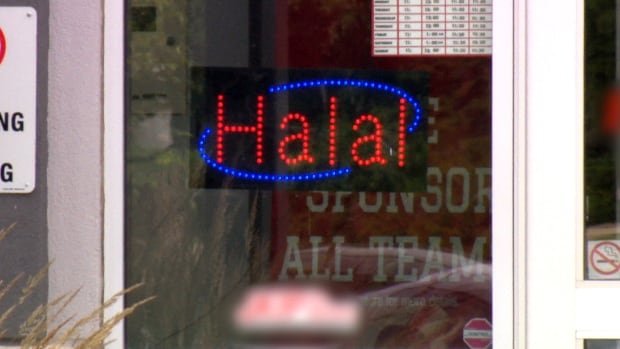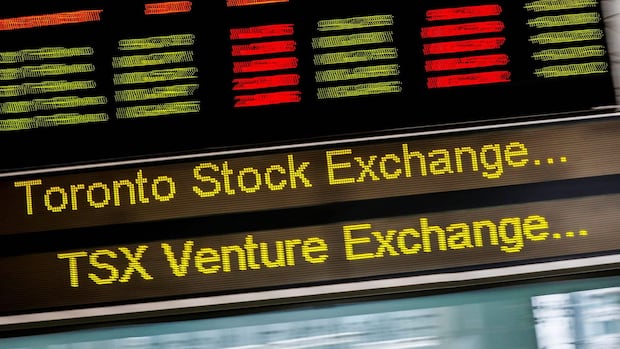Challenging and frustrating.
That’s how Mohammad Arfan describes his experience trying to get the answers he needs before sitting down to a meal.
As the face of In2Spices, a YouTube channel he runs with his wife, Sarah, dedicated to profiling halal restaurants, he eats out a lot — and his 13,000 followers are proof Canadians are hungry for halal options they can trust.
“You want to walk in with your friends and your family to have a nice meal … the last thing you want to be worried about is the pizza in front of me,” Arfan said.
Walking out of restaurants because he’s not sure the halal food he’s about to enjoy meets his standards is a sad but all-too-common reality for the couple, and one that may be familiar to the almost two million Muslims across Canada.
“It happened just last week,” said Arfan.
High demand for halal, little help for consumers
Canadians are spending more than a billion dollars a year on halal food products. And an increasing number of fast-food giants are trying to cash in on that market by offering halal menu items.
But a Marketplace investigation found that some of those chains can’t answer basic questions about the halal items they’re selling, and the certification they provide as proof can’t always be trusted.
The Canadian Food Inspection Agency requires any product that’s labelled, advertised or sold as halal to be certified. But consumers, including Arfan, say getting clear information about the halal items on the menu, and the restaurant’s suppliers, isn’t easy.
What’s worse, says Sarah Arfan, is when restaurants get it wrong. Misinformation about halal food they’re consuming is harmful, she said.
“At the end of the day, it affects our faith and our belief.”
Canada’s top chains put to the test
To see how well informed some of Canada’s top fast-food chains are about the halal food they’re selling, Marketplace went undercover at 10 restaurants — KFC, Popeyes, Osmow’s, Boston Pizza, and Mary Brown’s — by visiting two locations across the Greater Toronto Area for each of the chains.
The team, which included a Muslim employee who follows a halal diet, asked a number of questions Muslim consumers and experts in the certification of halal food told Marketplace they need answered before feeling comfortable sitting down to eat.
Employees at six of the 10 spots visited told the team the entire restaurant was certified halal — in fact, not one of the 10 locations Marketplace visited is.
“I would be very disappointed if I was the customer of that restaurant and having to find out that I am being misled,” said Imam Omar Subedar after Marketplace showed him a number of hidden camera clips.
Subedar runs the Halal Monitoring Authority (HMA), one of Canada’s largest halal certifying agencies, and says the certification system is often misused.

In those six visits, fast-food employees showed the undercover team a halal certificate issued to a meat supplier, certifying their meat as halal — but the employee used the document to suggest the entire restaurant was certified.
This happened at both Mary Brown’s locations, one Osmow’s, one KFC, one Popeyes and a Boston Pizza location.
“It is very unfortunate that this is something that is prevalent in the industry,” Subedar said.
An entire restaurant can only be certified if every ingredient used at the location is checked by the certifier and follows the criteria needed to be halal, according to Subedar and other halal certification bodies. Also, there must be no pork products or alcohol served on the premises.
Halal means permissible in Arabic. In order for food to be considered halal, it must be prepared according to Islamic guidelines. For meat like chicken, beef or lamb, that means the animal must first be in good health and treated humanely.
Then, a prayer is recited before the animal is slaughtered by a Muslim — either with a swift, deep cut across the throat by hand with a knife or using a machine. The meat cannot come into contact with anything not considered halal.
Hand-slaughtered vs. machine-slaughtered
How an animal is slaughtered is an important distinction for many Muslim consumers.
But when Marketplace asked restaurants if the meat being sold as halal was hand- or machine-slaughtered, four of the 10 locations couldn’t say or or gave them wrong information.
While many Muslims will consume machine-cut meat, others are only comfortable eating hand-slaughtered meat, “if they’re being fed something that’s machine cut, but it was presented as hand, it’s going to be a big violation of their trust. And for them they feel that now it’s also going to impede on their relationship with God,” said Subedar.
At two KFC restaurants and one Boston Pizza, employees did not know the method of slaughter on the day the team visited.
At one Osmow’s location, Marketplace was told all the meat was machine-slaughtered, and the team was shown a certificate for Maple Leaf, certified by the HMA. However, both Maple Leaf and the HMA later told Marketplace all the supplier’s halal certified chicken is hand-slaughtered — not machine.
The team was also shown eight expired halal certificates during the undercover visits. The outdated documents were found at an Osmow’s, Mary Brown’s and a Boston Pizza, the latter of which produced certificates that had expired eight years ago.
Subedar wasn’t surprised to see the expired certificates.
While there may be some locations who do get it right, Marketplace’s spot check revealed a number of issues which Subedar believes need to be addressed.
He said he believes most of the misinformation Marketplace uncovered comes down to a lack of training for employees and a poor understanding of what halal is — and is not an intent to mislead consumers.
“If you want to … keep the confidence of the consumer, put more effort in,” he said. “And try and make sure that what the piece of paper is saying is consistent with what you’re serving.”
Restaurants respond
In emails, Osmow’s told Marketplace all of its meat is hand-slaughtered and they have purchased the highest-quality halal products. They also said they will contact their certifiers to learn more about the process.
Mary Brown’s emailed Marketplace to say it will continue to educate front-line staff to identify halal ingredients with confidence. The restaurant said it’s committed to transparency and remains dedicated to inclusivity and accommodating the diverse needs of all Canadians, according to the email.
At Boston Pizza, locations that offer halal are required to complete online training, the restaurant said in an email. It said halal certificates are regularly updated and accessible to the locations that choose to provide halal menu items.
KFC and Popeyes did not respond to requests for comment.
WATCH | Financial advisors starting to special in halal portfolios:
Roughly five per cent of Canadians identify as Muslim, and many face major investment hurdles because of religious restrictions. But more financial advisors are specializing in creating halal investment portfolios.
Part of the problem, according to Subedar and others, is the lack of consistency in certification. There are more than a dozen halal certification agencies in Canada, each with its own policies, procedures and differing levels of oversight.
While the CFIA requires halal products and food being sold to be certified, the federal agency does not do the certification itself. Instead, it relies on halal certification agencies, which, in Canada, are unregulated. With no agreed-upon standard among certifiers, consumers are left to wade through the criteria set by each different certifier.

New Jersey: a road map for halal certification that truly serves consumers
Things are much clearer for consumers in New Jersey. There, the state oversees a halal disclosure program. Any business serving halal food must complete and post a halal disclosure form, which clearly indicates the halal standards it upholds.
It’s that level of clarity and transparency that the Arfans would like to see afforded to Canadian consumers as well.
“It just saves you the hassle of asking again and again,” Mohammad Arfan said.
Subedar agrees Canadian consumers need more transparency when it comes to halal certification.
He’s calling on the federal government to do more.
“First and foremost, we need to decide what the standard is going to be,” he said. “Everyone needs to be aligned with those standards — and then there should be periodic audits, just like there’s audits for everything.”
CFIA fails to answer calls for more oversight
Marketplace requested an interview with the CFIA to address the confusion and inconsistencies in Canada’s halal certification system.
In emails, the CFIA told Marketplace the intent of their certification requirement is to provide information to consumers so they can make informed decisions. It’s the responsibility of the certification bodies to ensure religious requirements are followed, the email said.
In the absence of improved federal oversight, Subedar says, it’s up to consumers to demand more transparency from the businesses they support.
“If the consumer is going to ask more questions and they’re going to hold those establishments accountable, then you’re going to see this unfortunate mess be somewhat cleaned up.”
And the Arfans say that businesses looking to capitalize on the growing demand for halal food need to step up.
“Everybody wants to be a part of it, but then [if] you want to be a part of it, do it properly.”



